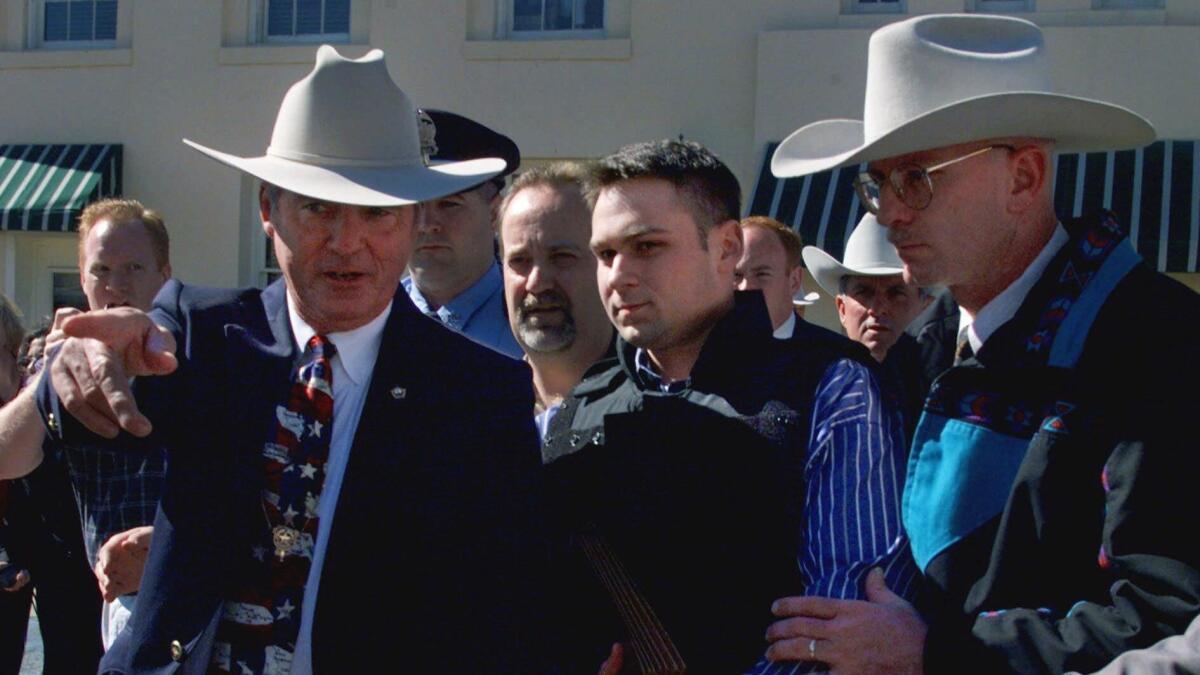Do condemned inmates get the last word through written statements? Not in Texas anymore

- Share via
Reporting from Houston — Condemned prison inmates in Texas for years could write final statements knowing officials would release their words to the public after they were executed.
Some inmates sounded remorseful in their statements, others unrepentant.
But the statement released last week on behalf of inmate John William “Bill” King after he was executed for the 1998 dragging death of James Byrd Jr. in Jasper, Texas, while simple, disturbed state Sen. John Whitmire.
Byrd, 49, was black. His three killers were white. One was sentenced to life without parole, the other two were executed. Neither expressed remorse at the executions, attended by several members of Byrd’s family.
King’s final statement read: “Capital punishment: Them without the capital get the punishment.”
Whitmire, elected in 1983 and now the Texas Senate’s longest-serving member, described the statement in an interview this week as “flippant” and “offensive.”
“Once and for all the Byrd family was going to have closure,” with King’s death, he said, but the state “kept his legacy alive.”
On Monday, Whitmire wrote to Texas corrections officials demanding they stop issuing such final statements. And on Tuesday, Texas corrections officials agreed to halt the practice ahead of the next scheduled execution Thursday.
“Should the offender choose to write a statement, it will be inventoried with their belongings and given to their pre-determined designee after the execution,” Bryan Collier, executive director of the Texas Department of Criminal Justice, wrote in a letter to Whitmire. “The agency will only relay to the public the last verbal statement given in the execution chamber.”
Whitmire, a Houston Democrat, said he did not oppose allowing condemned inmates a few last words, “an opportunity to show remorse, apology, I love you to loved ones.” But that’s different than a final statement, he said, especially from someone like King, 44, an avowed racist.
“He certainly didn’t give James Byrd any opportunity for some last words,” said Whitmire, chairman of the Texas Senate’s criminal justice committee. “The prison system accommodates the worst of the worst by reading the statement. Why would we accommodate him at all?”
It was King’s co-defendant’s execution that lead Whitmire to complain about Texas satisfying condemned inmates’ elaborate last-meal requests, ending the practice eight years ago.
Lawrence Russell Brewer, 44, had requested an epic last meal before his 2011 execution: two chicken-fried steaks with gravy and sliced onions; a triple-patty bacon cheeseburger; a cheese omelet with ground beef, tomatoes, onions, bell peppers and jalapeños; a bowl of fried okra with ketchup; one pound of barbecued meat with half a loaf of white bread; three fajitas; a meat-lover’s pizza; one pint of Blue Bell Ice Cream; a slab of peanut-butter fudge with crushed peanuts; and three root beers.
“He didn’t eat any of it,” Whitmire said.
Whitmire complained the next day, and Texas restricted final meals to the prison menu. He said he felt the same way about final statements: “Why let these convicted capital murderers manipulate the system right up to their last breath?”
Some inmates’ last words have proved incendiary, others bizarre or remorseful.
“I did not kill anyone. Y’all are killing an innocent man,” Jonathan Green said before Texas executed him in 2012 for killing a 12-year-old girl a decade before.
Yosvanis Valle apologized before his 2009 Texas execution in connection with a gang killing, adding, “I understand why I am paying this price.”
States have great discretion in setting such death penalty procedures, according to Robert Dunham, executive director of the nonprofit Death Penalty Information Center in Washington, which researches and tracks executions.
Dunham said eliminating inmates’ final statements, like any other change to execution protocol, could become grounds for appeal.
On March 28, the U.S. Supreme Court stopped Texas from executing Patrick Murphy after his Buddhist spiritual advisor was denied access to the death chamber because he wasn’t on prison staff like other chaplains. Texas corrections officials changed their policy, barring all spiritual advisors from executions, and Murphy is awaiting a new execution date.
Nationwide, 37 executions are scheduled this year, including half a dozen next month in Alabama, Florida, Georgia, Tennessee and Texas. Two are scheduled Thursday, both for double murders: Scotty Morrow in Georgia and Dexter Johnson in Texas.
More to Read
Sign up for Essential California
The most important California stories and recommendations in your inbox every morning.
You may occasionally receive promotional content from the Los Angeles Times.














